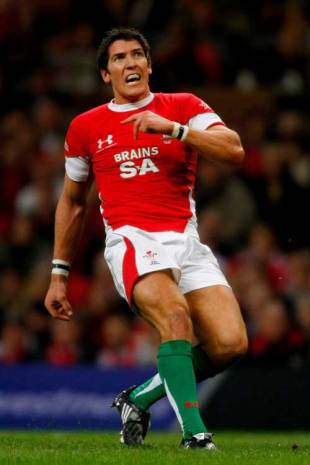|
British & Irish Lions
Lions should bank on creative Hook
Huw Richards
May 26, 2009

James Hook's late Lions call-up could provide the tourists with a much-needed attacking spark
© Getty Images
Enlarge
So, great news for James Hook. Leigh Halfpenny's, hopefully temporary, setback is Hook's opportunity, his plane ticket to Toronto exchanged for the more coveted ride to South Africa. It could be good news for the Lions as well. There could be no serious complaint at the choice of Stephen Jones and Ronan O'Gara, the most effective eligible outside-halves, in the original touring party, but there was the worry that in their immense, unflashy virtues they are slightly too similar. Some sort of variation, offering a different way of playing, was missing. That is what Hook offers. He may as yet lack their dependability and sureness of game management, but has greater creative qualities - in particular the ability to break a defensive line by a subtle shift of direction or change of pace. Too fragile a talent for South Africa ? Hardly. Just think of the last Lions tour of the Republic. Neil Jenkins' goal-kicking, Jeremy Guscott's drop-goal, Scott Gibbs' flattening of Os du Randt and Keith Wood's testing-to-destruction of the accompanying documentary team's bleep machine have rather obscured memories that the outside-half in 1997 was not the four-square Jenkins - taking a somewhat unwelcome sabbatical at fullback - but that wackiest, most mercurial of talents, Gregor Townsend. So don't be too surprised if Hook claims the place that his talent demands and plays a serious role in the Test series.That the other two recent call-ups, Tom Croft and Ross Ford, might also be serious Test candidates suggests one of two things - genuine depth, or perhaps the odd misstep in the original selection. And like Croft, Hook's chances of at least being involved as a bench selection are enhanced by the ability to play more than one position. Versatility, while prized by selectors, can of course be double-edged. Hook is Wales's heir-apparent at outside-half, seven and a half years younger than Jones. The danger, though, is of not setting consistently into a single position of which you then become the master, but of shuffling to fulfil team needs and never quite making one place your own. The careers of men like Peter Morgan, a 1980 Lion who looked like the future of Welsh rugby, are a warning of what can go wrong. And whether Hook's call up is ultimately good news for either Wales or the Ospreys is highly questionable. The spate of injuries, suspensions and replacements that has followed the naming of the original party has shifted its balance. When it was chosen there were 14 players from Ireland including eight Munstermen. Now that number is eleven and five - is there a voodoo master somewhere sticking pins in effigies of Munster players ? Wales now have the largest single-country contingent with 12 - which will become 13 if and when Halfpenny's medical treatment progresses sufficiently for him to join the party. There are now seven Ospreys, including the Irishman Tommy Bowe. Congratulations to all of them, but there is a price associated with going on Lions tours. Top-class rugby is demanding enough in physical and mental terms under normal conditions. Going on a Lions tour means players will be less rested, likelier to be injured and more prone to the sense of anticlimax that can follow major events when next season starts. The impact is evident in international results from the following season. Not since 1978 has the country with the largest Lions contingent won the subsequent season's championship. And that, let us remember, was at the culmination of one of the two greatest eras in Welsh history. Nor had Gareth Edwards, Gerald Davies and J.P.R Williams, the team's established superstars, gone on the Lions tour of New Zealand in 1977. Time perhaps to get your money on France, who far from coincidentally have won five of the seven post-Lions championships, including all three in the professional era, in the thirty-odd years since. And finally... he's not strictly within the limits of this column as he's played all his rugby in and for England, but the warmest possible wishes to Martin Corry on his retirement. A worthy adversary who has battled for England in the tough times, ever willing to, in American terms 'take one for the team', he has epitomised almost stereotypical English virtues - decent, dogged, selfless and, lest we forget, quite some player. How many of those qualities can be traced back to having a Welsh mother - Corry has been quoted as saying that he 'understands enough Welsh to ask for a cup of tea'; which puts him ahead of quite a lot of us - is for the reader to decide. But good luck to him, in any language. © Scrum.com
|
Live Sports
Communication error please reload the page.
-
Football
-
Cricket
-
Rugby
-
- Days
- Hrs
- Mins
- Secs
F1 - Abu Dhabi GP
Abu Dhabi Grand Prix December 11-131. Max Verstappen ()
2. Valtteri Bottas (Mercedes)
3. Lewis Hamilton (Mercedes)
4. Alexander Albon ()
5. Lando Norris ()
6. Carlos Sainz Jr ()
-
ESPNOtherLive >>
Darts - Premier League
Golf - Houston Open
Snooker - China Open
Tennis - Miami Open

